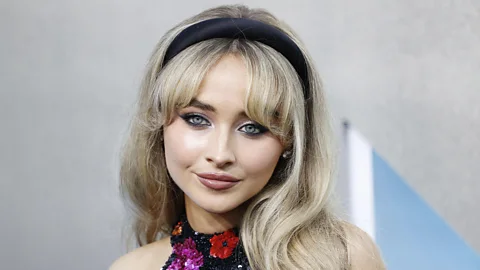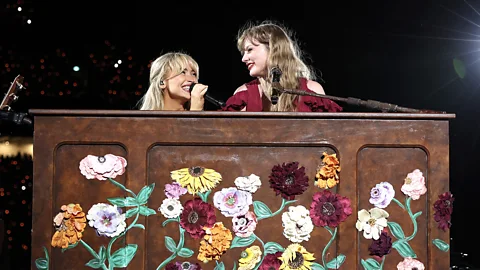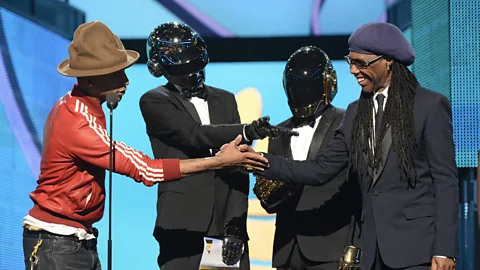'It invites the listener to join in': How Sabrina Carpenter's Espresso became the song of the summer
 Alamy
AlamyThe American singer-songwriter's breezy disco bop has been inescapable over the last few months. Here experts dissect why it has had such a hold over popular culture – and our summer holidays
There is no official metric to determine the "song of the summer", an evocative term popularised in a 1999 New York Times column by music critic Ann Powers, who concluded that Backstreet Boys' I Want It That Way was the season's preeminent anthem that year. Though Billboard and the UK's Official Charts Company now compile insightful "songs of the summer" charts based on cumulative sales, airplay and streaming over a preordained period, part of the concept's appeal lies in its somewhat nebulous quality: it's based on collective consensus rather than cold hard stats. The song of the summer is the one that seems to soundtrack your middle of the year months even if you never consciously put it on – you just keep hearing it on the radio, in bars and coming out of someone else's smartphone.
More often than not, it's a song that really captures the balmy, breezy ideal of what summer is supposed to feel like. Think back to Harry Styles' Watermelon Sugar in 2020 or Nicki Minaj's Super Bass in 2011. This year, while Charli XCX's gleefully hedonistic Brat album has become a cultural phenomenon and Shaboozey's hardscrabble country bop A Bar Song (Tipsy) has topped the Billboard Hot 100 for five consecutive weeks, one song has harnessed this sense of infinite possibility more than any other: Espresso by US singer-songwriter Sabrina Carpenter. "There's a lightness and warmth to Espresso's funky sound that makes it perfect for carefree summer listening," says entertainment and culture journalist Hollie Geraghty.
How the buzz grew
When Carpenter announced Espresso's release in April, she said she "just wanted to put out a little song before Coachella". It duly dropped on the 11th of that month, a day before her first set at the California music festival. But crucially, the single's mid-spring debut gave it time to build towards summer ubiquity as it permeated the public's consciousness. Espresso reached its peak position of number three on the Billboard Hot 100 on 22 June; in the UK, it spent five non-consecutive weeks at number one between 5 May and 21 July. At a concert in Las Vegas on 19 May, pop superstar Adele told the audience that Espresso was "my jam" because she could relate to the lyric: "I'm working late because I'm a singer".
However, when Espresso was released in April, another ear-snagging line became a social media obsession: "That's that me espresso." Bradley Stern, a music journalist and co-host of pop culture podcast Legends Only, says its "silly and absurd" quality made it prime meme material. He suggests that pop fans latched onto this lyric partly because of its nonchalant approach to grammar; an equally nonsensical line from Ariana Grande's 2014 hit Break Free, "Now that I've become who I really are", had previously been embraced in this way. He also believes that Carpenter's quirky chorus hook "piques people's curiosity" in a similar style to the onomatopoeic title of Kylie Minogue's Padam Padam, a song of the summer contender in 2023.
Beyond its intriguingly offbeat payoff, Geraghty says Carpenter's hit is filled with the "cheeky pop lyrics that she writes so well". As a whole, the song hinges on the idea that her partner is suffering from insomnia because he is so infatuated with her. "Say you can't sleep, baby, I know, that's that me espresso," she sings on the chorus. Elsewhere, her lyrics are peppered with an infectious brand of syntax-mangling self-confidence. "Walked in and dream-came-trued it for ya," Carpenter boasts. "The song of the summer has to be a good time first and foremost, and Espresso is one of those self-love anthems that allows pop fans to – as Gen Z would put it – feel like the main character," Geraghty says. When Carpenter sings "I can't relate to desperation", it's empowering in a way that doesn't feel forced.
 Getty Images
Getty ImagesCarpenter, who wrote Espresso with its producer Julian Bunetta and songwriters Amy Allen and Steph Jones, told Vogue that she "saw a beach atmosphere" as soon as she heard it. For this reason, the playful video shows Carpenter picking up a credit card belonging to a man who has just fallen out of a speed boat, then enjoying an indulgent day at the beach as she is fanned by men holding palm fronds. Though the clip really captures what Stern describes as Carpenter's "cheeky wink-wink persona", he doesn't necessarily believe it has been pivotal to Espresso's success. "I think the song is what culturally took over, not the video," he says.
What makes it sound so seasonal
It's a song precision-tooled to sound "summery". Music journalist and songwriter-producer Charlie Harding, who co-hosts a podcast about the making and meaning of pop music, Switched on Pop, says Carpenter's vocals are "mixed to emphasise the breathiness that feels like a refreshing summer breeze". Dr Joe Bennett, a musicologist at Berklee College of Music, notes that Carpenter's "breathy delivery" is "offset with stacked [vocal] harmonies on every chorus," including some that highlight particular phrases such as "this one boy". He says this combines with "the handclap doubling the snare drum" to turn Espresso into "a song that invites the listener to join in", which makes it even more infectious.
Harding also believes that Espresso's cleverly layered production evokes a "nostalgia for summers past" that will chime with several generations of listeners. "Its sampled organic drums are reminiscent of 2000s hip-hop; the synth bass is straight out of 1990s R&B, the synth leads send you all the way back to the 1980s and the Nile Rodgers-style guitar parts are as shimmery as a 1970s disco ball," he says. On a less forensic level, he suggests that "you can find the same midtempo summery production" in a more recent song of the summer contender: Miley Cyrus's 2009 smash Party in the USA.
More like this:
• The 10 most sizzling summer screen romances
Bennett classifies Espresso as part of the ongoing "disco revival" sparked by Daft Punk's 2013 chart-topper Get Lucky and continued in more recent hits such as Dua Lipa's Levitating (2020) and Lizzo's About Damn Time (2022). He notes that Espresso's "relaxed" tempo of 104 BPM is "pretty slow for a disco-influenced song", but still "close" to several classics of the genre including Abba's Take a Chance on Me and Bee Gees' Stayin' Alive. Meanwhile, Stern says the song's "chilled disco groove" has "certain similarities" to Doja Cat's 2020 smash Say So, which weaves strands of funk and disco into a frothy pop-rap banger.
Still, like all songs of the summer, Espresso is somehow more than the sum of its parts. As Harding points out, "every songwriter is looking to create the catchiest song with a compelling concept, memorable melody, unique production and some magical 'it' factor that sends it directly into the hearts of millions". In Espresso's case, this 'it' factor could be the fact that Carpenter feels like the right artist at the right time. Though she is still only 25, the Pennsylvania-born star has been releasing music for more than a decade, slowly growing a loyal and clued-up fanbase along the way.
 Getty Images
Getty ImagesCarpenter's career began in earnest in 2013 when she landed a lead role in the Disney Channel sitcom Girl Meets World. The following year, she released a folky debut single, Can't Blame a Girl for Trying, through Disney-owned Hollywood Records, which had previously launched a string of successful singer-actors including Miley Cyrus and Selena Gomez. Carpenter put out four albums with Hollywood, but her success was solid rather than spectacular until 2021, when she switched to a different label: Island Records. By this point, her folk and country-based early material had made way for a glossier sound that drew from dance-pop and R&B.
That January, Carpenter scored her first Billboard Hot 100 and UK Top 40 hit with Skin, a resilient synth-pop ballad that some fans interpreted as a "response song" to Olivia Rodrigo's contemporaneous single Drivers License. At the time, Carpenter was romantically involved with Joshua Bassett, Rodrigo's co-star in High School Musical: The Musical: The Series, which sparked rumours of a "love triangle". On Drivers License, Rodrigo sings: "And you're probably with that blonde girl who always made me doubt." Carpenter's Skin, released just two weeks later, finds the singer musing: "Maybe you didn't mean it. Maybe 'blonde' was the only rhyme." Carpenter dismissed the suggestion that Skin was "calling out one single person", but the online intrigue certainly raised her profile.
She enjoyed another social media moment in late 2022 when Nonsense, a playful pop-R&B song from her fifth album Emails I Can't Send, went viral on TikTok. Carpenter's penchant for reworking its tongue-in-cheek outro lyrics to reference the city she was in when playing it live really showed off her appealingly cheeky personality. Carpenter then gained further exposure by opening for Taylor Swift on her phenomenally successful Eras Tour between August 2023 and March of this year. Stern believes all of this legwork, boosted a little by her tabloid-friendly relationship with Saltburn actor Barry Keoghan, created "the perfect storm" for Espresso to take her career stratospheric. "To Gen Z, she was already what we would call a 'main pop girl'," he says. "But I think Espresso made other generations pay more attention to her."
Carpenter has already proved that Espresso was no fluke: her follow-up single Please Please Please, a country-flecked disco tune co-written with Swift's producer Jack Antonoff, outperformed Espresso in the US by reaching number one on the Billboard Hot 100 in June. Geraghty believes Carpenter is breaking out now after a decade of hard graft because she is "irreverent and doesn't take herself too seriously", which feels "refreshing in the current pop landscape", where a certain earnestness had begun to set in. At this point, Geraghty says Carpenter has honed "her own nonchalant musical formula that hits the sweet spot between relatable and glamorous".
Still, the best yardstick for measuring Carpenter's post-Espresso glow-up will come this Friday when she releases Short n' Sweet, her sixth studio album, but the first to arrive with a hefty sense of expectation behind it. Lauren Kreisler, director of brand and digital at the Official Charts Company, notes that Carpenter has spent 12 weeks at number one in the UK this summer – seven with Espresso, then five with Please Please Please – and adds drily: "But turning our nation of tea drinkers into espresso converts is something else entirely!"
Whatever happens next, Carpenter has given us an energising summer smash that feels just as potent with autumn approaching. For now, the caffeine rush shows no sign of wearing off.
--
If you liked this story, sign up for The Essential List newsletter – a handpicked selection of features, videos and can't-miss news, delivered to your inbox twice a week.
